现在完成时短暂性转换延续性
短暂性动词-延续性动词和现在完成时

短暂性动词-延续性动词和现在完成时短暂性动词,延续性动词和现在完成时延续性动词是指动作发生后还可以延续一段时间或者相当长的一段时间。
如:live, work, study, learn, sleep 等,延续性动词可以和表示一段的时间状语连用。
短暂性动词是指动作一旦发生就立即结束。
它不能和一段时间连用。
这类动词有:go, come, arrive, leave, begin, start, join, marry 等;★在否定句中,短暂性动词可以和表示一段时间的状语连用。
We haven’t hea rd from Jane for a long time.★短暂性动词的肯定式不能与表示一段时间的for 或since 或how long 等状语连用。
★值得注意的是,表示一段时间的状语除了“for+一段时间”外,还有since+n./从句(时间点),since+时间段+ago ,疑问词how long ,in the past+时间段,all these+时间段,from…to (时间点)以及till/until+n./句子等等。
例如:.I have received his letter for three days (×) I have received his letter.(√)How long did she leave .(×) How long has she been away? (√)★★★如果短暂性动词与表示一段时间的时间状语连用,必须将短暂性动词改为延续性动词。
现归纳总结一下由非延续性动词到延续性动词的转换:arrive →be here ★除了用上面的转化形式之外,还可以用其他的表达形式:A. It is 或者 It has been+时间+since……(动词用过去式),B.主语+谓语(过去时)+时间+ago 。
例如:It’s five days since I received his letter.arrive →be herebegin(start)→be ondie →be deadcome back →be backleave →be away (from)fall ill(asleep)→beill( asleep) get up →be up go out →be out finish →be over put on →wear 或be on open →be open close →be closed join →be in/ be a member of go to school →be a student borrow →keep buy/get →have catch(a cold)→ have(a cold) get to know →know begin to study →study come to work →work move to → live in finish/end → be over come to → be in sit down → be seatedHis father died three years ago.看一个句子可以用以下几种说法:他离开上海已经3天了。
把短暂性动词转换为延续性词方法
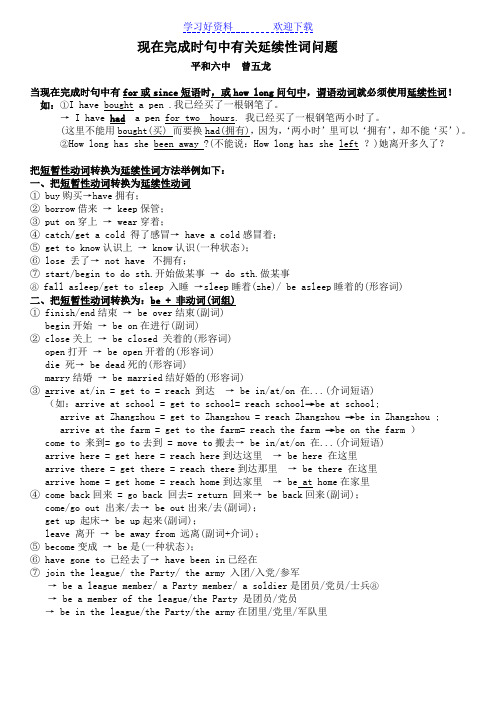
现在完成时句中有关延续性词问题平和六中曾五龙当现在完成时句中有for或since短语时,或how long问句中,谓语动词就必须使用延续性词!如:①I have bought a pen .我已经买了一根钢笔了。
→ I have had a pen for two hours. 我已经买了一根钢笔两小时了。
(这里不能用bought(买) 而要换had(拥有),因为,‘两小时’里可以‘拥有’,却不能‘买’)。
②How long has she been away ?(不能说:How long has she left ?)她离开多久了?把短暂性动词转换为延续性词方法举例如下:一、把短暂性动词转换为延续性动词① buy购买→have拥有;② borrow借来→ keep保管;③ put on穿上→ wear穿着;④ catch/get a cold 得了感冒→ have a cold感冒着;⑤ get to know认识上→ know认识(一种状态);⑥ lose 丢了→ not have不拥有;⑦ start/begin to do sth.开始做某事→ do sth.做某事⑧ fall asleep/get to sleep 入睡→sleep睡着(zhe)/ be asleep睡着的(形容词)二、把短暂性动词转换为:be + 非动词(词组)① finish/end结束→ be over结束(副词)begin开始→ be on在进行(副词)② close关上→ be closed 关着的(形容词)open打开→ be open开着的(形容词)die 死→ be dead死的(形容词)marry结婚→ be married结好婚的(形容词)③ arrive at/in = get to = reach 到达→ be in/at/on 在...(介词短语)(如:arrive at school = get to school= reach school→be at school;arrive at Zhangzhou = get to Zhangzhou = reach Zhangzhou →be in Zhangzhou ;arrive at the farm = get to the farm= reach the farm →be on the farm )come to 来到= go to去到 = move to搬去→ be in/at/on 在...(介词短语)arrive here = get here = reach here到达这里→ be here 在这里arrive there = get there = reach there到达那里→ be there 在这里arrive home = get home = reach home到达家里→ be at home在家里④ come back回来 = go back 回去= return 回来→ be back回来(副词);come/go out 出来/去→ be out出来/去(副词);get up 起床→ be up起来(副词);leave 离开→ be away from 远离(副词+介词);⑤ become变成→ be是(一种状态);⑥ have gone to 已经去了→ have been in已经在⑦ join the league/ the Party/ the army 入团/入党/参军→ be a league member/ a Party member/ a soldier是团员/党员/士兵⑧→ be a member of the league/the Party 是团员/党员→ be in the league/the Party/the army在团里/党里/军队里按要求把短暂性动词转换为延续性词的练习A.1)He got to Beijing five minutes ago.He ________ _________ _________ Beijing for _________ _________.2)I moved to the USA last year.I ________ ________ __________ the USA since __________ __________.3)I went home yesterday.I _______ ________ _________ home for _________ __________.4)They came here last week.They _________ _________ here since _________ __________.B.1)He came out two years ago.He _________ __________ _________ for __________ __________.2)We return to Fuzhou yesterday.We ________ ________ _________ to Fuzhou since __________.C.1)I became a teacher in 2000.I ________ __________ a teacher for _________ _________.2)The river became dirty last year.The river _________ _________ dirty for _________ __________.D.1)The shop closed two hours ago.The shop ________ _________ _________ for _________ _________.2)The door opened at six in the morning.The door ________ ________ ________ for six hours.E.1)I got up two hours ago.I ________ ________ ________ since ________ ________.2)He left Fuzhou just now.He _______ ________ ________ _________ Fuzhou for five minutes.3)My grandpa died in 2002.My grandpa _______ _______ ________for _______ ________.4)The meeting finished at six.The meeting ________ ______ ______ for six hours.5)I got to sleep two hours ago.I ________ _________ _________ since _________ __________.6)They married in 1990.They ________ _________ __________since _________.F.1)I began to teach at this school in 1995.I ____ ____ at this school since ____.2)The film began two minutes ago.The film ____ ____ ____ for ____ ____.G.1)They borrowed it last week.They _________ _________ it since __________ __________.2)I bought a pen two hours ago.I _________ _________ a pen for ________ __________.3)I got to know him last year.I _________ __________ him since __________ __________.4)I put on my glasses three years ago.I __________ __________ my glasses for _________ _________.H.1)He has gone to Beijing.He ____ ____ _____ Beijing for two days.I.1)He joined the league in 2002.He ________ _________ a _________ _________ for two years.He ________ __________ a __________ ___________ the __________ for two years.He ____________ ___________ ___________ the league for two years.2)My brother joined the army two years ago.My brother __________ __________ a ___________ for ___________ ___________.My brother ___________ ___________ in ____________ ___________ for two years.答案按要求把短暂性动词转换为延续性词(当句中有for或since短语时就必须转换为延续性词) A.1)He got to Beijing five minutes ago. 他五分钟前到达北京的。
现在完成时中短暂性动词与延续性动词的转换

在以下句型中,短暂性动词要转换成延续性动词:
1.完成时态的肯定句 2. 句中, 有for或since引导的, 或其他种类的表示一段时间的时间状语
例如: He has died for 20 years. 这句话就是错误的。 die是一个瞬间动词,需要转化为延续性动词。 句子改为 He has been dead for 20 years.
现在完成时中 短暂性动词与延续性动词的转化
也称做终止性动词、非延续性动词或瞬 间动词。
表示动作不能延续, 只是一瞬间就结束 的动作。
come, go, arrive, reach, see, hear, close, open, leave, begin, start, lose, buy, fall, join, die, become, borrow, get up 等.
1.实义动词转化成实义动词
2.转化成be+形容词或介词
3.转化成be+名词(词组)
His grandfather
His grandfather His grandfather
His grandfather
It’s five years since his grandfather died. Five years has passed since his grandfather died.
His brother has been in the army .
It’s two years since his brother joined the army .
Two years has passed since his brother joined the army .
相关练习
8B unit2 课课练 grammar部分有相关练习 可自行完成, 核对答案
现在完成时延续性动词转换

②come/go back return
→ be back
come/go out → be out
1) He came out two years ago. He __h_a_s___ __b_e_e_n___ _o_u_t____ for ___tw_o____ _y_e_a_r_s___. 2) We return to Fuzhou yesterday. We _h_a_v_e__ __b_e_e_n__ _b_a_c_k___ to Fuzhou since _y_e_s_t_e_rd_a_y.
1) He joined the league in 2002. He _h_a_s__ _b_e_e_n__ a __le_a_g_u_e_ _m_e_m__b_e_r for two years. He _h_a_s___ _b_e_e_n___ a _m_e_m__b_e_r __o_f ___ the __le_a_g_u_e_ for two years. He __h_a_s____ _b_e_e_n____ __i_n______the league for two years. 2) My brother joined the army two years ago. My brother __h_a_s____ __b_e_e_n___ a __s_o_ld_i_e_r_ for two years. My brother _h_a_s___ _b_e_e_n__ in __th_e____ __a_rm__y__ for two years.
⑧have/has gone to → have been in
1) He has gone to Beijing. He _h_a_s_ _b_e_e_n __in___ Beijing for two days.
延续性动词和短暂性动词和现在完成时题目

He joined the Party 2 years ago.He has bee n in the Party for 2 years. I bought the book 5 days ago.子中的谓语动词一般为延续性动词。
但是,有些动词所表示的动作是短暂的,这类动词 叫做非延续性动词。
如: come, go, reach, arrive, leave, borrow, buy, jo in, die, begi n, start, finish 等。
在现在完成时的句子中,非延续性动词作谓语动词时,不能和表示一段时间的 状语连用。
表示动作的连续性,就要把非延续性动词转换成相应的延续性动词或短语,具 体转换如下:(要求记住)come/go/reach/arrivein/be leave 宀 beaway from, borrow keep, buy have, jo inbein/be a member of, die bedead, start/begin rbe finish/endbeer, openbe open (adj.), close be closed (adj.), marry Ice m eatci6/(go back to / returnto beback to go out be outbecome be get upbe dpi be dead fall asleep /get tot sleep be asleepienot have put on wear catch / get a coldhave acold ; get to know knovhave / has gone tohave been in注意:1. 非延续性动词可以在现在完成时的否定句中作谓语,并可以与 for , since 引导的时间状语连用,表示动作的延续过程。
例如:She hasn ' t bought anyew clothes since last year.2. 在现在完成时的肯定句中,非延续性动词作谓语时不能与 for , si nee 引导的表示一段时间的状语连用,但可以用其他句式来表示同一个意思。
修改名词:现在完成时练习(短暂性动词与延续性动词的转换)

修改名词:现在完成时练习(短暂性动词与延续性动词的转换)现在完成时是英语语法中一种重要的时态,用于表示发生在过去但与现在有关的动作或经验。
在构成现在完成时的句子中,我们经常需要使用动词的现在分词形式。
然而,对于一些动词,我们需要将其转换为名词形式。
短暂性动词的转换短暂性动词是指表示短暂或瞬间动作的动词,这些动作不具有持续性。
在现在完成时句子中,我们需要将短暂性动词转换为名词形式。
举个例子:- 原始句子:He drank a cup of coffee.- 转换后的句子:He has had a cup of coffee.在这个例子中,我们将短暂性动词"drank"转换为名词形式"had"。
以下是一些常见的短暂性动词及其对应的转换形式:- bring -> have brought- eat -> have eaten- see -> have seen- take -> have taken- buy -> have bought延续性动词的转换延续性动词是指表示持续性或进行性动作的动词,这些动作具有一定的时间跨度。
在现在完成时句子中,我们需要将延续性动词转换为名词形式。
举个例子:- 原始句子:She has been reading a book.- 转换后的句子:She has had a book.在这个例子中,我们将延续性动词"reading"转换为名词形式"had"。
以下是一些常见的延续性动词及其对应的转换形式:- read -> have had- write -> have written- study -> have studied- work -> have worked- play -> have played通过将短暂性动词和延续性动词转换为名词形式,我们可以更准确地表达现在完成时的动作或经验。
初中英语短暂性动词转换为延续性动词
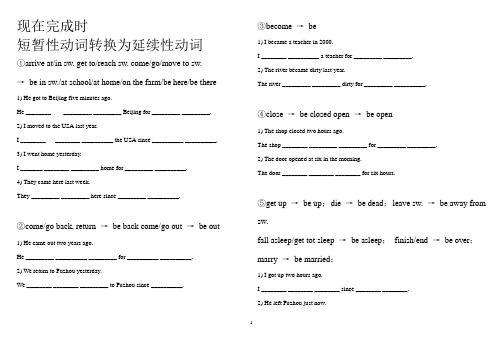
现在完成时短暂性动词转换为延续性动词①arrive at/in sw. get to/reach sw. come/go/move to sw.→be in sw./at school/at home/on the farm/be here/be there 1) He got to Beijing five minutes ago.He ________ _________ _________ Beijing for _________ _________.2) I moved to the USA last year.I ________ ________ __________ the USA since __________ __________.3) I went home yesterday.I _______ ________ _________ home for _________ __________.4) They came here last week.They _________ _________ here since _________ __________.②come/go back, return →be back come/go out →be out1) He came out two years ago.He _________ __________ _________ for __________ __________.2) We return to Fuzhou yesterday.We ________ ________ _________ to Fuzhou since __________. ③become →be1) I became a teacher in 2000.I ________ __________ a teacher for _________ _________.2) The river became dirty last year.The river _________ _________ dirty for _________ __________.④close →be closed open →be open1) The shop closed two hours ago.The shop ________ _________ _________ for _________ _________.2) The door opened at six in the morning.The door ________ ________ ________ for six hours.⑤get up →be up;die →be dead;leave sw. →be away from sw.fall asleep/get tot sleep →be asleep;finish/end →be over;marry →be married;1) I got up two hours ago.I ________ ________ ________ since ________ ________.2) He left Fuzhou just now.He _______ ________ ________ _________ Fuzhou for five minutes.3) My grandpa died in 2002.My grandpa _______ _______ ________for _______ ________.4) The meeting finished at six.The meeting ________ ______ ______ for six hours.5) I got to sleep two hours ago.I ________ _________ _________ since _________ _________.6) They married in 1990.They ________ _________ __________since _________.⑥start/begin to do sth. →do sth. ;begin →be on1) I began to teach at this school in 1995.I ____ ____ at this school since ____.2) The film began two minutes ago.The film ____ ____ ____ for ____ ____.⑦borrow →keep;lose →not have ;buy →have ;put on →wearcatch/get a cold →have a cold;get to know →know1) They borrowed it last week.They _________ _________ it since __________ __________. 2) I bought a pen two hours ago.I _________ _________ a pen for ________ __________.3) I got to know him last year.I _______ _______ him since __________ __________.4) I put on my glasses three years ago.I __________ __________ my glasses for _________ _________.⑧have/has gone to →have been inHe has gone to Beijing.He ____ ____ _____ Beijing for two days.⑨join the league/the Party/the army→be a league/a Party member/a soldier→be a member of the league/the Party→be in the league/the Party/the army1) He joined the league in 2002.He ________ _________ a _________ _________ for two years.He _______ _________ a __________ ___________ the __________ for two years. He ____________ ___________ ___________ the league for two years.2) My brother joined the army two years ago.My brother ________ __________ a ___________ for ___________ ___________. My brother __________ ___________ in ____________ ___________ for two years.。
现在完成时态的动词转换
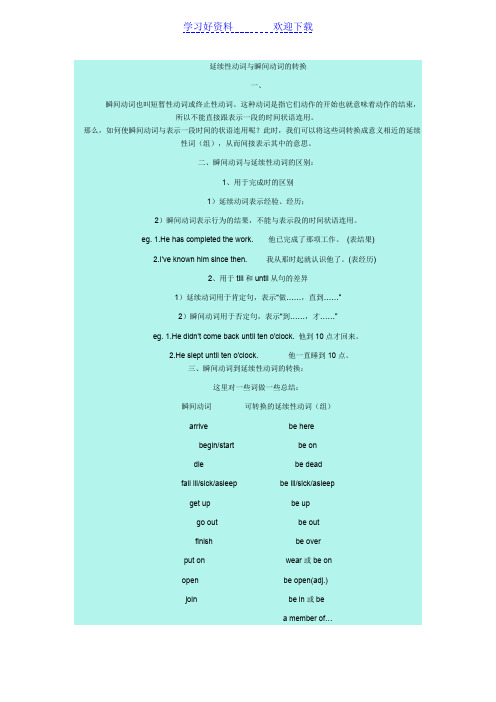
延续性动词与瞬间动词的转换一、瞬间动词也叫短暂性动词或终止性动词。
这种动词是指它们动作的开始也就意味着动作的结束,所以不能直接跟表示一段的时间状语连用。
那么,如何使瞬间动词与表示一段时间的状语连用呢?此时,我们可以将这些词转换成意义相近的延续性词(组),从而间接表示其中的意思。
二、瞬间动词与延续性动词的区别:1、用于完成时的区别1)延续动词表示经验、经历;2)瞬间动词表示行为的结果,不能与表示段的时间状语连用。
eg. 1.He has completed the work.他已完成了那项工作。
(表结果)2.I've known him since then.我从那时起就认识他了。
(表经历)2、用于till和until从句的差异1)延续动词用于肯定句,表示“做……,直到……”2)瞬间动词用于否定句,表示“到……,才……”eg. 1.He didn't come back until ten o'clock. 他到10点才回来。
2.He slept until ten o'clock.他一直睡到10点。
三、瞬间动词到延续性动词的转换:这里对一些词做一些总结:瞬间动词可转换的延续性动词(组)arrive be herebegin/start be ondie be deadfall ill/sick/asleep be ill/sick/asleepget up be upgo out be outfinish be overput on wear或be onopen be open(adj.)join be in或bea member of…close be closedgo to school be a studentborrow keepbuy havecatch(a cold) have(a cold)get to know knowbegin to study studycome to work workget up be upleave be away from等如:1.He has been a soldier for three years. 他参军三年了。
中考英语短暂性动词与延续性动词相互转换讲练 (6)
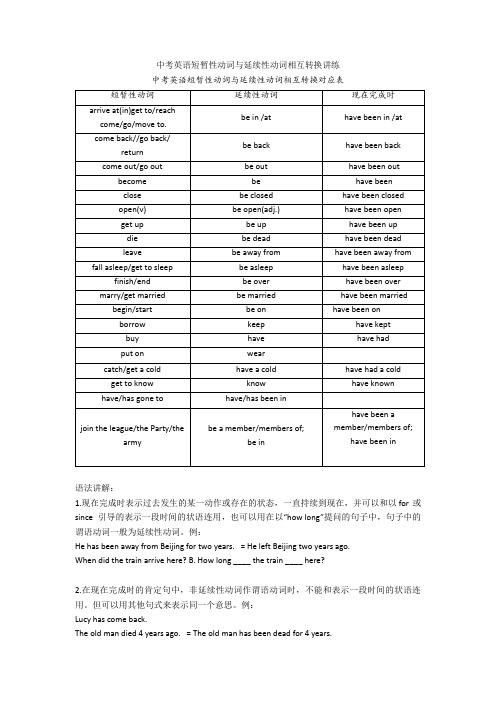
中考英语短暂性动词与延续性动词相互转换讲练中考英语短暂性动词与延续性动词相互转换对应表语法讲解:1.现在完成时表示过去发生的某一动作或存在的状态,一直持续到现在,并可以和以 for或since引导的表示一段时间的状语连用,也可以用在以“how long”提问的句子中,句子中的谓语动词一般为延续性动词。
例:He has been away from Beijing for two years. = He left Beijing two years ago.When did the train arrive here? B. How long ____ the train ____ here?2.在现在完成时的肯定句中,非延续性动词作谓语动词时,不能和表示一段时间的状语连用。
但可以用其他句式来表示同一个意思。
例:Lucy has come back.The old man died 4 years ago. = The old man has been dead for 4 years.He has been away from Beijing for two years.= He left Beijing two years ago.= It is two years since he left Beijing.= Two years has passed since he left Beijing.3.非延续性动词可以在现在完成时的否定句中作谓语,并可以与for,since引导的时间状语连用,表示动作的延续过程。
例如:She h asn’t bought any new clothes since last year.I haven’t borrowed the book for a long time.巩固习题:1. When he arrived at the bus stop, the bus ________ for 20 minutes.A. has leftB. had leftC. has been awayD. had been away2. I ______ the League for 5 years so far.A. joinedB. have joinedC. have been in3. The factory ________ since the February of 1988.A . has been open B. has opened C. was open D. opened4. Mary and Rose _______friends since they met in 2000.A. have madeB. have beenC. madeD. have become5.The meeting _______ for a week now.A. has finishedB. has endedC. has been over6.Miss Gao ______ this school for nearly 5 years.A. has been inB. has come toC. has taught7.Ben ______ a teacher for 4 years .A. has beenB. has becomeC. wasD. became8. I ______ home for a week.A. have returnedB. have been backC. returned9. How long _______ he ________ ?A. diedB. has, diedC. has, been dead10. ----- How long can I ______ the book? ------ Two weeks.A. borrowB. lendC. getD. keep11.He ________ the car for a week.A. boughtB. has boughtC. has had12.-----How long _____ you _____ ill ? -----Two weeks.A. did fallB. have, fellC. have, been13.Since 2000, he _____ his hometown.A. has leftB. has moved awayC. has been away from14.I'll lend you the book , but you can only _____ it for 2 days.A. borrowB. keepC. take15.The bus ______ on the road for 2 hours so far.A. has stoppedB. stoppedC. has been16. Tom is ill in hospital. He _______ a cold for several days.A. isB. catchesC. has caughtD. has had17.He ________ for 2 hours.A. got upB. has got upC. has been up二、英语书面表达专项训练2.假如你是李华,你的英国笔友 Jack 给你写邮件表达了想参加你校暑期为外国学生举办的汉语夏令营的愿望,希望你告知活动举办的具体时间地点,活动安排以及你的建议。
现在完成时Since和for的用法

注意事项:1.本试卷满分为100 分,考试时间为80 分钟。
2.答卷前先将密封线左侧的项目填写清楚。
3.答案须用黑色字迹的钢笔、签字笔或圆珠笔书写,密封线内不得答题。
现在完成时Since 和for 的用法Since 和for 的用法表示过去已经开始持续到现在的动作或状态常用的时间状语有:for, since, how long, so far, these days 等。
Since+过去点的时间,for+一段时间(数词+量词),此划线部分用how long 提问。
一、since 短语或从句表示过去的动作延续至今,since 之后的时间为一点。
如:Mr. Smith has worked here since 1984. 1984 年以来,史密斯先生一直在这工作。
He’s learned about 5,000 English words since he went to college.他上大学以来大约学了五千个英语单词。
二、for 短语表示动作延续多长时间,for 的宾语为时间段。
如:We have known each other for twenty years. 我们认识有二十年了。
I haven’t seen her for a long time.我好久没有见到她了。
练习:用since 和for 填空1) two years 2) two years ago 3) last month4) 1999 5) yesterday 6) 4 o’clock7) 4 hours 8) an hour ago 9) we were children10) lunch time 11) she left here1.He has lived in Nanjing the year before last.2.I’ve known him we were children.3.Our teacher has studied Japanese three years.4.She has been away from the city about ten years.5.It’s about ten years she left the city.2.短暂性转换延续性①arrive at/in sw. get to/reach sw. come/go/move to sw.→ be in sw./at school/at home/on the farm/be here/be there1)He got to Beijing five minutes ago.He Beijing for .2)I moved to the USA last year.I the USA since .3)I went home yesterday.I home for .4)They came here last week.They here since .②come/go back, return → be back come/go out → be out1)He came out two years ago.He for .2)We return to Fuzhou yesterday.We to Fuzhou since .③become → be1)I became a teacher in 2000.I a teacher for .2)The river became dirty last year.The river dirty for .④close → be closed open → be open1)The shop closed two hours ago.The shop for .2)The door opened at six in the morning.The door for six hours.⑤get up → be up die → be deadleave sw. → be away from sw.fall asleep/get tot sleep → be asleepfinish/end → be over marry → be married1)I got up two hours ago.I since .2)He left Fuzhou just now.He Fuzhou for five minutes.3)My grandpa died in 2002.My grandpa for .4)The meeting finished at six.The meeting for six hours.5)I got to sleep two hours ago.I since .6)They married in 1990.They since .⑥start/begin to do sth. → do sth. begin → be on1)I began to teach at this school in 1995.I at this school since .2)The film began two minutes ago.The film for .⑦borrow → keep lose → not have buy → have put on →wearcatch/get a cold → have a cold get to know →know1)They borrowed it last week.They it since .2)I bought a pen two hours ago.I a pen for .3)I got to know him last year.I him since .4)I put on my glasses three years ago.I my glasses for .⑧have/has gone to → have been in1) He has gone to Beijing.He Beijing for two days.⑨join the league/the Party/the army→ be a league/a Party member/a soldier→ be a member of the league/the Party→ be in the league/the Party/the army1)He joined the league in 2002.He a for two years.He a the for two years. He the league for two years.2)My brother joined the army two years ago.My brother a for . My brother in for two years.3.汉译英1)这本字典我已买了三年了。
延续性动词和短暂性动词转换归纳
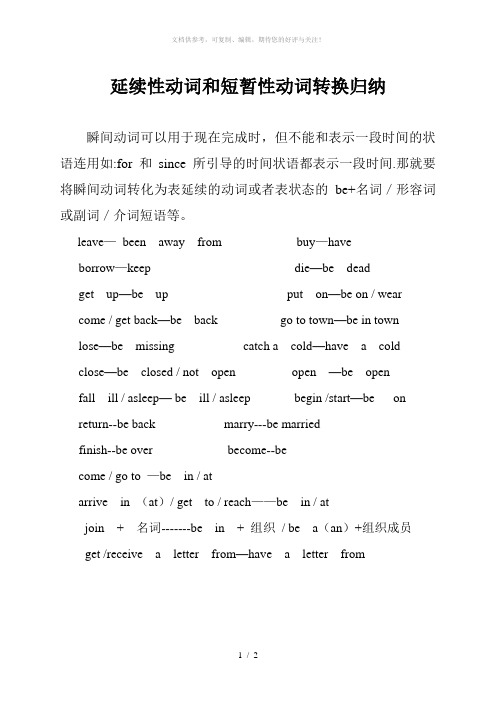
延续性动词和短暂性动词转换归纳瞬间动词可以用于现在完成时,但不能和表示一段时间的状语连用如:for 和since 所引导的时间状语都表示一段时间.那就要将瞬间动词转化为表延续的动词或者表状态的be+名词/形容词或副词/介词短语等。
leave—been away from buy—haveborrow—keep die—be deadget up—be up put on—be on / wearcome / get back—be back go to town—be in townlose—be missing catch a cold—have a coldclose—be closed / not open open —be openfall ill / asleep— be ill / asleep begin /start—be onreturn--be back marry---be marriedfinish--be over become--become / go to —be in / atarrive in (at)/ get to / reach——be in / atjoin + 名词-------be in + 组织/ be a(an)+组织成员get /receive a letter from—have a letter from一看时间状语。
如果句中没有表示过去确切时间的状语,常用现在完成时;如果有,则只能用一般过去时。
如:I have visited the factory.I visited the factory last year.二看句首有无疑问词。
如果笼统地问人家做过某事了吗(句首无疑问词),常用现在完成时;但进一步询问何时、何地、何原因、用什么方式做那事时(句首有疑问词)就要用一般过去时。
如:-Have you had your breakfast? -Yes, I have.-When did you have it? -At seven thirty.注意:这种用法是以连贯性问答为背景的。
(完整版)延续性动词和短暂性动词转换归纳

延续性动词和短暂性动词转换归纳瞬间动词可以用于现在完成时,但不能和表示一段时间的状语连用如:for 和since 所引导的时间状语都表示一段时间.那就要将瞬间动词转化为表延续的动词或者表状态的be+名词/形容词或副词/介词短语等。
leave—been away from buy—haveborrow—keep die—be deadget up—be up put on—be on / wear come / get back—be back go to town—be in town lose—be missing catch a cold—have a cold close—be closed / not open open —be open fall ill / asleep— be ill / asleep begin /start—be on return--be back marry---be marriedfinish--be over become--become / go to —be in / atarrive in (at)/ get to / reach——be in / atjoin + 名词-------be in + 组织/ be a(an)+组织成员get /receive a letter from—have a letter from一看时间状语。
如果句中没有表示过去确切时间的状语,常用现在完成时;如果有,则只能用一般过去时。
如:I have visited the factory.I visited the factory last year.二看句首有无疑问词。
如果笼统地问人家做过某事了吗(句首无疑问词),常用现在完成时;但进一步询问何时、何地、何原因、用什么方式做那事时(句首有疑问词)就要用一般过去时。
如:-Have you had your breakfast? -Yes, I have.-When did you have it? -At seven thirty.注意:这种用法是以连贯性问答为背景的。
现在完成时延续性动词转换
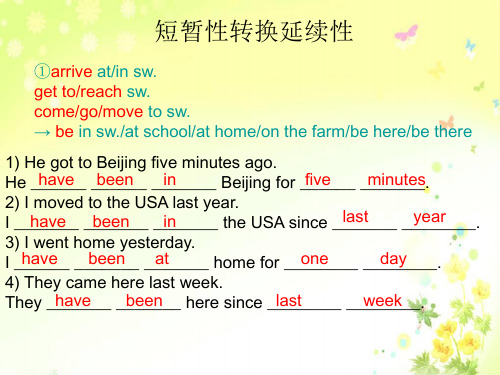
⑧have/has gone to → have been in 1) He has gone to Beijing. He ____ ____ _____ Beijing for two days. has been in
⑨join the league/the Party/the army → be a league member /a Party member/a soldier → be a member of the league/the Party → be in the league/the Party/the army
1) He joined the league in 2002. league member He _____ ______ a _______ _______ for two years. has been league He ______ _______ a _______ ______ the _______ for two years. has been member of He ________ ________ _________the league for two years. has been in 2) My brother joined the army two years ago. My brother ________ ________ a ________ for two years. has been soldier My brother ______ ______ in _______ _______ for two years. has been the army
短暂性转换延续性
①arrive at/in sw. get to/reach sw. come/go/move to sw. → be in sw./at school/at home/on the farm/be here/be there 1) He got to Beijing five minutes ago. have been in five minutes He ______ ______ _______ Beijing for ______ _______. 2) I moved to the USA last year. last year have been in I _______ _______ _______ the USA since _______ ________. 3) I went home yesterday. have been at one day I ______ _______ _______ home for ________ ________. 4) They came here last week. have been last week They _______ _______ here since ________ ________.
短暂性动词与延续性动词详解,转换表及练习
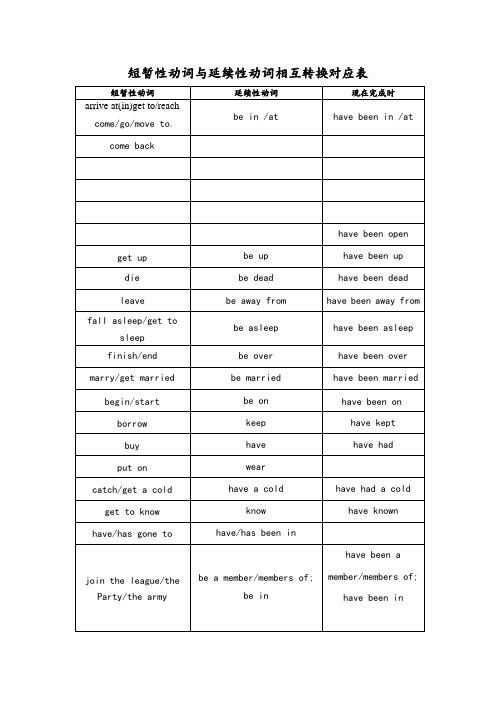
短暂性动词与延续性动词相互转换对应表语法讲解:1.现在完成时表示过去发生的某一动作或存在的状态,一直持续到现在,并可以和以for或since引导的表示一段时间的状语连用,也可以用在以“how long”提问的句子中,句子中的谓语动词一般为延续性动词。
例:He has been away from Beijing for two years. = He left Beijing two years ago.When did the train arrive here B. How long ____ the train ____ here2.在现在完成时的肯定句中,非延续性动词作谓语动词时,不能和表示一段时间的状语连用。
但可以用其他句式来表示同一个意思。
例:Lucy has come back.The old man died 4 years ago. =The old man has been dead for 4 years.He has been away from Beijing for two years.= He left Beijing two years ago.= It is two years since he left Beijing.= Two years has passed since he left Beijing.3.非延续性动词可以在现在完成时的否定句中作谓语,并可以与for,since引导的时间状语连用,表示动作的延续过程。
例如:She hasn’t bought any new clothes since last year.I haven’t borrowed the book for a long time.巩固习题:1. When he arrived at the bus stop, the bus ________ f or 20 minutes.A. has leftB. had leftC. has been awayD. had been away2. I ______ the League for 5 years so far.A. joinedB. have joinedC. have been in3. The factory ________ since the February of 1988.A . has been open B. has opened C. was open D. opened4. Mary and Rose _______friends since they met in 2000.A. have madeB. have beenC. madeD. have becomemeeting _______ for a week now.A. has finishedB. has endedC. has been overGao ______ this school for nearly 5 years.A. has been inB. has come toC. has taught______ a teacher for 4 years .A. has beenB. has becomeC. wasD. became8. I ______ home for a week.A. have returnedB. have been backC. returned9. How long _______ he ________A. diedB. has, diedC. has, been dead10. ----- How long can I ______ the book ------ Two weeks.A. borrowB. lendC. getD. keep________ the car for a week.A. boughtB. has boughtC. has hadlong _____ you _____ ill -----Two weeks.A. did fallB. have, fellC. have, been2000, he _____ his hometown.A. has leftB. has moved awayC. has been away fro m'll lend you the book , but you can only _____ it for 2 days.A. borrowB. keepC. takebus ______ on the road for 2 hours so far.A. has stoppedB. stoppedC. has been16. Tom is ill in hospital. He _______ a cold for several days.A. isB. catchesC. has caughtD. has ha d________ for 2 hours.A. got upB. has got upC. has been up。
短暂性动词

短暂性动词,延续性动词和现在完成时短暂性动词是指动作一旦发生就立即结束。
它不能和一段时间连用。
这类动词有:go, come, arrive, leave, begin, start, join, marry等;短暂性动词的肯定式不能与表示一段时间的for或since或how long等状语连用。
例如:His father got ill. I have received his letter.但是,不能够说:His father got ill for a week.I have received his letter for three days.在否认句中,短暂性动词能够和表示一段时间的状语连用。
例如:We haven’t heard from Jane for a long time.I suppose something must have happened to her.延续性动词是指动作发生后还能够延续一段时间或者相当长的一段时间。
如:live, work, study, learn, sleep等,延续性动词能够和表示一段的时间状语连用。
值得注意的是,表示一段时间的状语除了“for+一段时间”外,还有since+n./从句(时间点),since+时间段+ago,疑问词how long,in the past+时间段,all these+时间段,from…to(时间点)以及till/until+n./句子等等。
例如:How long _______ your brother joined the army?A. hasB. hadC. is it sinceD. was there that通过审题,答案B和D很容易被排除,但是稍不注意便会选中答案A;殊不知how long为一段时间的状语,不能与非延续性动词短语has joined连用,所以这题的准确答案是C。
另外,动词的延续性与非延续性还表达在这两种句型中:延续性动词的肯定式+till/ until 短暂性动词的否认式+till/ until请看例句:We waited until he came.I didn’t go to bed until my father came back home last night.假如短暂性动词与表示一段时间的时间状语连用,必须将短暂性动词改为延续性动词。
- 1、下载文档前请自行甄别文档内容的完整性,平台不提供额外的编辑、内容补充、找答案等附加服务。
- 2、"仅部分预览"的文档,不可在线预览部分如存在完整性等问题,可反馈申请退款(可完整预览的文档不适用该条件!)。
- 3、如文档侵犯您的权益,请联系客服反馈,我们会尽快为您处理(人工客服工作时间:9:00-18:30)。
现在完成时用法
短暂性转换延续性
1 转换成延续性动词如do keep have wear have a cold
start/begin to do sth. → do sth.
borrow → keep lose → not have
buy → have put on → wear
catch/get a cold → have a cold
get to know → know
2 be +介词
begin → be on
be in sw./at school/at home/on the farm
3 be +形容词,副词
come/go back, return → be back come/go out → be out close → be closed open → be open
become → be
get up → be up die → be dead
leave sw. → be away from sw.
fall asleep/get tot sleep → be asleep
finish/end → be over marry → be married
be here/be there
4 join用法
join the league/the Party/the army
→ be a league/a Party member /a soldier
→ be a member of the league/the Party
→ be in the league/the Party/the army
①arrive at/in sw. get to/reach sw. come/go/move to sw.
→be in sw./at school/at home/on the farm/be here/be there
He got to Beijing five minutes ago.
He ________ _________ _________ Beijing for _________ _________.
I moved to the USA last year.
I ________ ________ __________ the USA since __________ __________.
I went home yesterday.
I _______ ________ _________ home for _________ __________.
They came here last week.
They _________ _________ here since _________ __________.
②come/go back, return → be back come/go out → be out
He came out two years ago.
He _________ __________ _________ for __________ __________.
We return to Fuzhou yesterday.
We ________ ________ _________ to Fuzhou since __________.
③become → be
I became a teacher in 2000.
I ________ __________ a teacher for _________ _________.
The river became dirty last year.
The river _________ _________ dirty for _________ __________.
④close → be closed open → be open
The shop closed two hours ago.
The shop ________ _________ _________ for _________ _________.
The door opened at six in the morning.
The door ________ ________ ________ for six hours.
⑤get up → be up die → be dead
leave sw. → be away from sw.
fall asleep/get tot sleep → be asleep
finish/end → be over marry → be married
I got up two hours ago.
I ________ ________ ________ since ________ ________.
He left Fuzhou just now.
He _______ ________ ________ _________ Fuzhou for five minutes.
My grandpa died in 2002.
My grandpa _______ _______ ________for _______ ________.
The meeting finished at six.
The meeting ________ ______ ______ for six hours.
I got to sleep two hours ago.
I ________ _________ _________ since _________ __________.
They married in 1990.
They ________ _________ __________since _________.
⑥start/begin to do sth. → do sth. begin → be on
I began to teach at this school in 1995.
I ____ ____ at this school since ____.
The film began two minutes ago.
The film ____ ____ ____ for ____ ____.
⑦borrow → keep lose → not have buy → have put on → wear catch/get a cold → have a cold get to know → know
They borrowed it last week.
They _________ _________ it since __________ __________.
I bought a pen two hours ago.
I _________ _________ a pen for ________ __________.
I got to know him last year.
I _________ __________ him since __________ __________.
I put on my glasses three years ago.
I __________ __________ my glasses for _________ _________.
⑧have/has gone to → have been in
He has gone to Beijing.
He ____ ____ _____ Beijing for two days.
⑨join the league/the Party/the army
→ be a league/a Party member/a soldier
→ be a member of the league/the Party
→ be in the league/the Party/the army
He joined the league in 2002.入团
He ________ _________ a _________ _________ for two years.
He ________ __________ a __________ ___________ the __________ for two years.
He ____________ ___________ ___________ the league for two years.
My brother joined the army two years ago.
My brother __________ __________ a ___________ for ___________ ___________.
My brother ___________ ___________ in ____________ ___________ for two years.。
